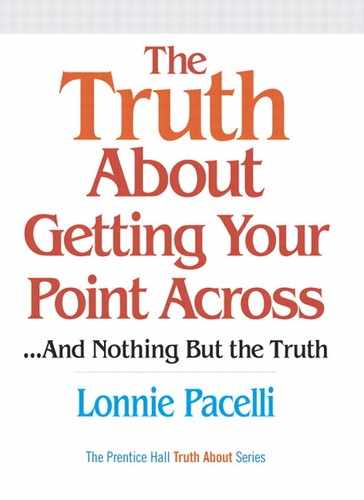Truth 39
Babbling Is for Babies, Not Interviews
My next question to him was, "Do you realize you talked nonstop for 30 minutes?"
Some years back I was interviewing candidates for a financial analyst position. One of my interviews was with a gentleman who was already a company employee but was looking for a new job within the company. I started the interview by asking, "What interests you about this job?" The fellow started his response but then launched into tangents about his family, prior jobs, and personal interests. About 5 minutes into the interview I'd already decided not to hire the guy, but I was intrigued by his verbal meandering. I decided to let him keep going just to see where he would end up. He finally stopped talking after half an hour. My next question to him was, "Do you realize you talked nonstop for 30 minutes?" Before he could launch into another wandering discourse, I thanked him for stopping by and told him I didn't think he was right for the job. He very well might have had the technical and business skills needed to do the job, but because he babbled on and on without clarity of thought, he was eliminated.
The demonstration of clear, concise thoughts through responses to interview questions is a major factor for your interviewer in deciding whether to hire you. When you respond to questions, your interviewer is not only listening to your answers but also imagining you talking with colleagues, suppliers, customers, or executives. If you, as an interviewee, can't respond with crisp, concise, thoughtful answers during an interview, imagine how you would come off in a major customer presentation. You may have some insightful things to say, but if they get lost in long, meandering responses, you'll seal your fate as a declined candidate.
The next time you interview for a job, keep the following things in mind:
- Target your responses around a key message. When asked a question, formulate your response around a key message or a series of key messages. State your key message first, and then provide a couple of sentences that support it. Know what your key message is before you start talking, or your response will meander.
- Watch the interviewer for frustration. Look for cues that the interviewer is impatient, confused, or bored. The best interviews I've done have been where an interviewee captured my interest by stating a key message and then we just talked. Look to capture the interviewer's interest. If he or she looks disinterested, wrap up your point and stop talking.
- Maintain eye contact with the interviewer. Maintaining eye contact helps you stick to your key message, because you won't get distracted. Eye contact also demonstrates conviction and confidence. Wandering eyes feel evasive and can contribute to babbling.
- Take a breath before you respond. Let the interviewer finish his question before you start responding. Take a second after the question, get your key message in your head, and then start your answer. Being too eager to answer the question will contribute to drifting from your key message and will brand you as rude.
- Don't argue with yourself. Don't play point/counterpoint with yourself. When asked a question, formulate your key message and take a stand in your response. It's OK to briefly identify the other side of an argument, but make sure you state a key message and don't give the perception that you are indecisive.
- Provide context to your answers. Don't just give yes-or-no-type answers without providing a bit of context behind the responses. The interviewer wants to know not only what your answer is, but also something about why you think the way you do. Be cautious about drifting on and on with your answer; make a couple of statements that support your key message, and then clam up.
- Ask your interviewer for feedback. At the end of the interview, consider asking the interviewer to give you some feedback on how he thinks the interview went. Specifically, ask about the quality and conciseness of your responses. Just be careful not to get into an argument about the interviewer's feedback; listen politely, and then thank him for the feedback. Don't create a negative impression with the interviewer by arguing or getting defensive over any feedback you receive.
It's easy when nervous or excited to babble on and on and lose focus in your responses to questions. Formulate key messages, maintain eye contact, watch your interviewer, and take a stand with your responses. You'll better engage your interviewer, captivate his or her interest, and help secure the job you want.
